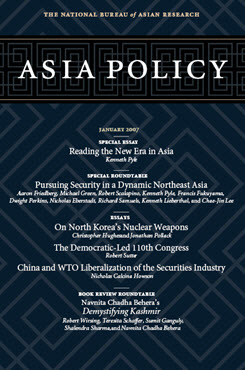The Democratic-Led 110th Congress
Implications for Asia
This essay assesses why and how the 110th Congress is likely to change U.S. policy toward Asia.
EXECUTIVE SUMMARY
MAIN FINDINGS
Despite many forecasts of stronger emphasis, tougher conditions, and major change regarding trade, human rights, and other U.S. policies, factors of power, priorities, politics, and personalities dilute the push in the 110th Congress for substantial change in U.S. policy in Asia. Close examination shows that the Democratic-led Congress has insufficient power and that Democratic members are insufficiently motivated and united to force a major shift in the course of U.S. relations with the region. Prevailing circumstances argue for only modest change in U.S. policy toward Asia as a result of the Democratic victory in 2006.
POLICY IMPLICATIONS
- The anticipated lapse of Trade Promotion Authority places pending free trade agreements in Asia in jeopardy. Such a turn of events could seriously hamper the Bush administration’s efforts to use free trade agreements to advance U.S. relations with Asian countries.
- China’s massive trade and foreign exchange surpluses and perceived unfair currency and trading practices will generate legislation and other actions that will apply pressure on the Bush administration to toughen the U.S. approach to China. Such pressure probably will fall short, however, of forcing significant protectionist measures against China.
- The failure to halt North Korea’s nuclear weapons program will prompt congressional oversight that presses for greater flexibility in U.S. negotiations with Pyongyang but offers no formula for changing the grim reality of a nuclear North Korea.
- Major congressional concerns in South Asia include anticipated votes to approve the U.S.-India nuclear cooperation agreement and large aid programs in Pakistan and Afghanistan. The Democratic victory could bolster resistance to Bush administration policies, though congressional positions will be heavily affected by developments in the region.
- Human rights concerns will deepen congressional antipathy to the military regime in Burma and could complicate Bush administration efforts to beef up relations with Indonesia, Kazakhstan, and other Asian states.
About Asia Policy
Asia Policy is a peer-reviewed scholarly journal presenting policy-relevant academic research on the Asia-Pacific that draws clear and concise conclusions useful to today’s policymakers. Asia Policy is published quarterly in January, April, July, and October and accepts submissions on a rolling basis. Learn more


